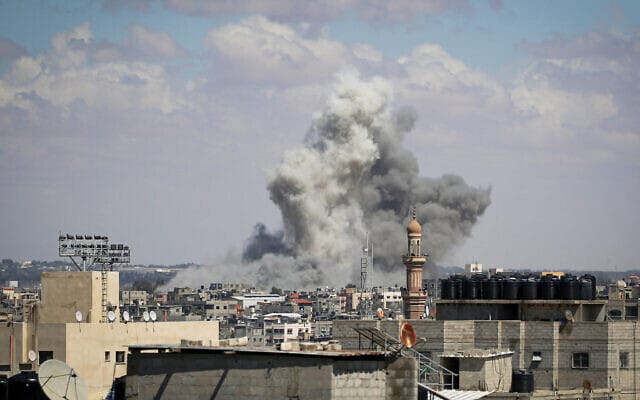Israel is now pushing forward with its long-foreshadowed operation in the city of Rafah, at the southernmost point of the Gaza Strip bordering Egypt.
After seizing the Gaza side of Rafah’s main border crossing with Egypt yesterday, Israel says its aim is now to “take out the last four Hamas brigades in Rafah”. And the defence minister says it’ll keep going until Hamas is “destroyed” or releases the hostages.
But the international community continues to oppose the idea.
Stay on top of your world from inside your inbox.
Subscribe for free today and receive way much more insights.
Trusted by 129,000+ subscribers
No spam. No noise. Unsubscribe any time.
Why? Before the Hamas attacks last October, Rafah was home to around 180,000 people. Today, nearly 80% of Gazans – or 1.3 million people – are now crammed there in dire humanitarian conditions, having sought (on Israel’s orders) shelter from the earlier violence up north.
Israel says its operation will only impact 100,000 people by focusing on a limited section of Rafah and providing clear safe zones.
But neither Israel’s critics nor its closest allies are buying it.
Top European diplomat Josep Borrell says the offensive will cause a lot of casualties, “whatever they [Israel] say”, while the US has reportedly even backed up its public objections by halting munitions deliveries.
Meanwhile, Israel’s neighbourhood is declaring its actions a “genocide” (theSaudis) and a “massacre” (the Jordanians), while UN chief António Guterres is saying it’s “a strategic mistake, a political calamity & a humanitarian nightmare.”
Not a lot of common ground there, which brings us to the ceasefire talks.
Since the last deal lapsed in November, mediation teams have criss-crossed the region hoping for a repeat, but they keep hitting hurdles.
Practically, these negotiations are like a game of telephone. Israel and Hamas each relay their demands via Egyptian, Qatari, and US mediators. Hamas then needs sign-off from its leaders in both Qatar and Gaza, with the latter step taking days as the group relays messages through the Strip circuitously to evade Israeli intelligence.
And that game of telephone might explain what’s now happened: Hamas announced on Monday night it had agreed to a deal, but Israel then said the deal was “far” from its original proposal. There are claims American mediators hadn’t looped Israel in, though US officials reject that and say “there have been no surprises.”
INTRIGUE’S TAKE
The other hurdle holding up negotiations? It’s political, in the power more than party sense.
Israel and Hamas have opposing, existential, and absolutist aims: the complete destruction of the other. But that doesn’t mean there’s nothing to negotiate. Rather, it means their negotiations are arguably less about altering those aims, and more about sequencing them.
Eg, from Israel’s perspective, will the defeat of Hamas happen before the remaining hostages are freed, or after?
Setting aside how realistic it is to completely eradicate Hamas, it opens up more political questions: for the Hamas leader in Gaza (Yahya Sinwar), the ~100 hostages are some of his few remaining sources of leverage. And that probably explains why he’s long seemed more opposed to a deal than his comrades in Qatar.
As for Israel? Look at the timing. News of the ‘deal’ emerged as its tanks were fueling for Rafah. So it meant Israel had to make a decision: halt or proceed. Its war cabinet voted unanimously to push on. So what does that tell us?
Notwithstanding the pleas from hostage families, allies, and the UN – plus the knife-edge negotiations – Netanyahu and his war cabinet are determined to end Hamas, and that means entering Rafah. For that, polls suggest they still have the backing of two key constituencies: 72% of Americans, and 55% of Netanyahu’s base at home.
Also worth noting:
- The US State Department will reportedly miss a deadline for today (Wednesday) to report on whether it finds credible Israel’s assurances that its use of U.S. weapons doesn’t violate U.S. or international law.
- Israel has halted aid shipments through the Rafah crossing since seizing it yesterday morning (Tuesday).








